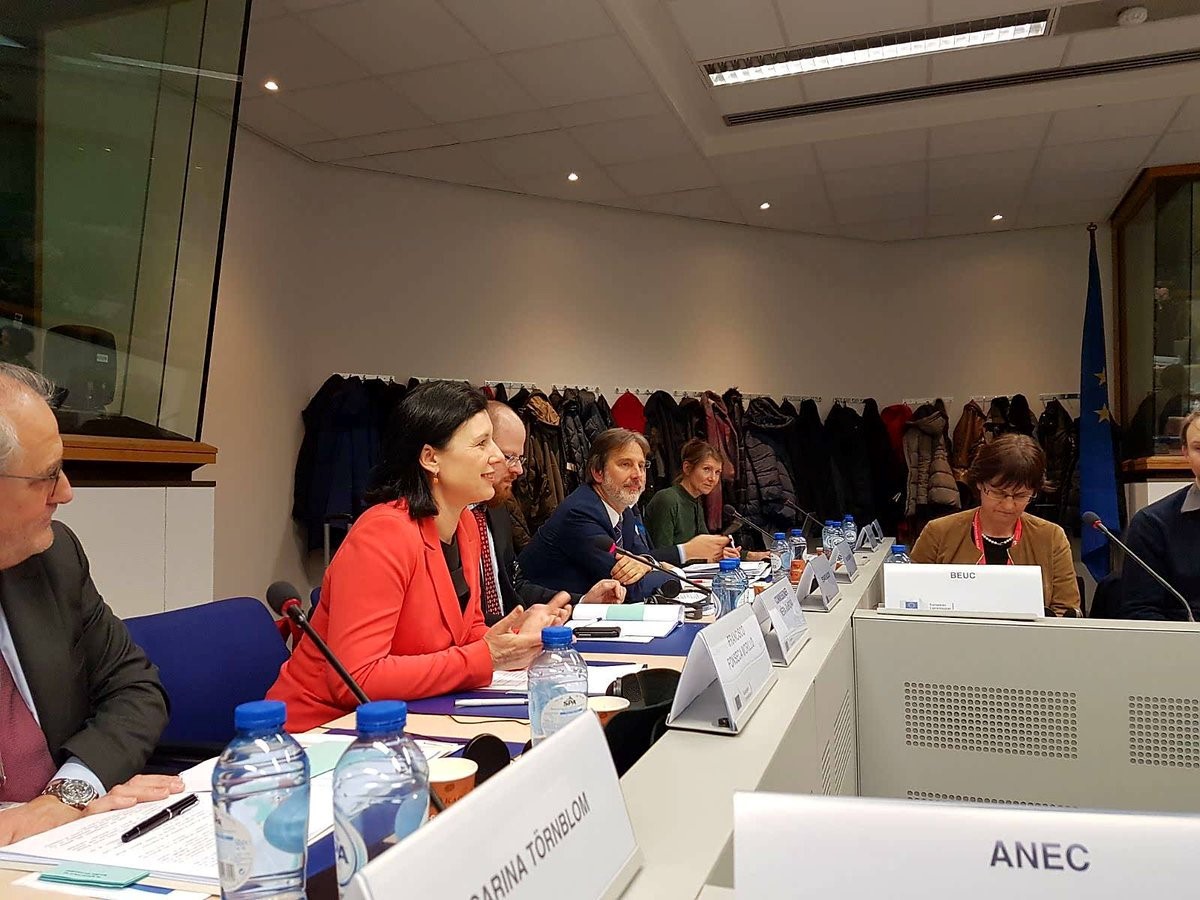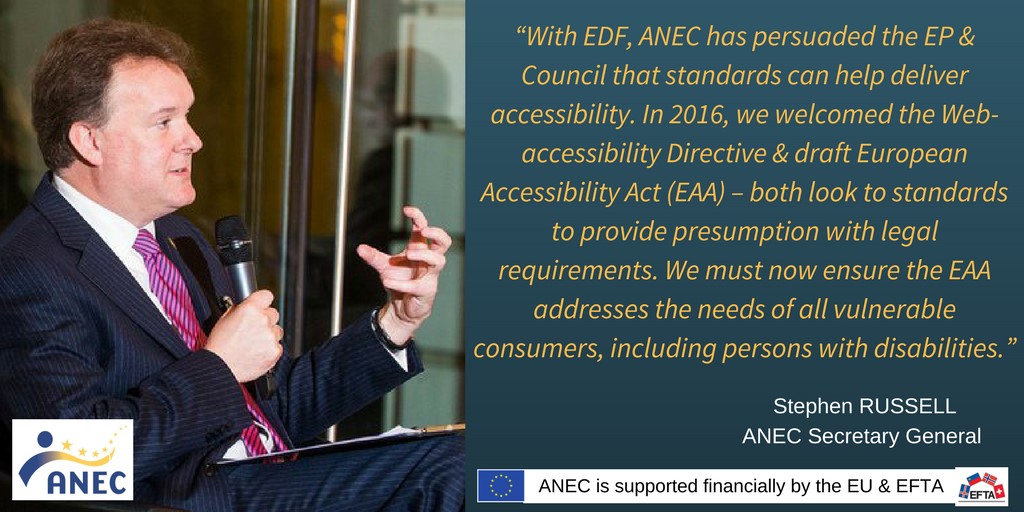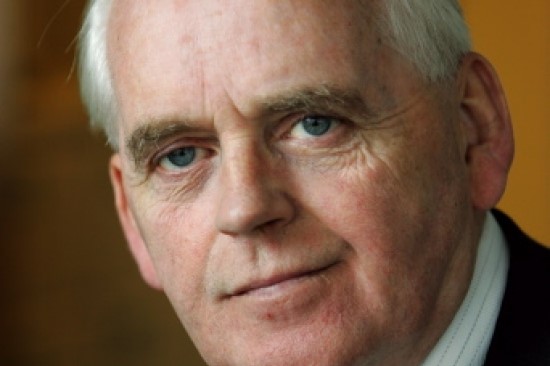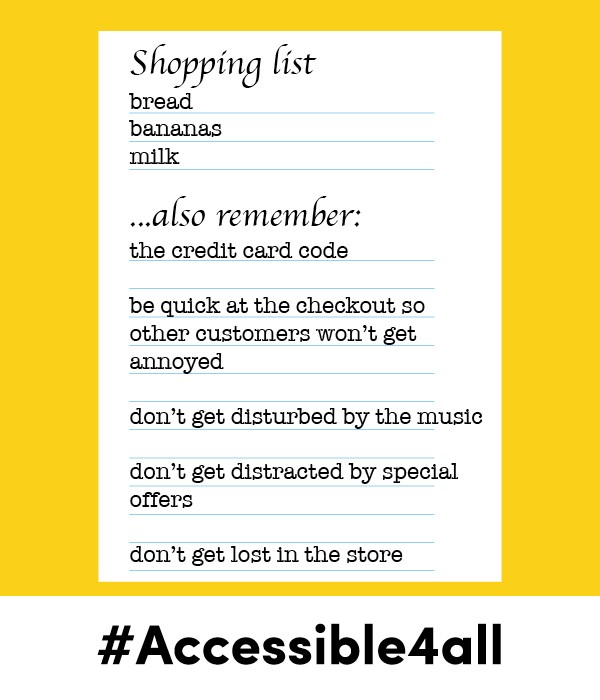VACANCY NOTICE
ANEC is seeking to recruit a Finance & Administration Manager from 1 April 2018.
See https://goo.gl/qTi93s for details
Horizontal
EC Communication on the implementation of EU standardisation policy
On 16 January, the European Commission (EC) published a Communication reporting on the implementation of EU standardisation policy, and contribution of European standards to EU policies.
The Report will serve as a basis for the long-foreseen inter-institutional dialogue with the European Parliament, Council, the Economic & Social Committee, and Committee of the Regions which should start this spring. It will aim at involving the European institutions more in standardisation policies (e.g. in setting priorities and strategies). We intend to contribute to the dialogue in order to promote the importance of an effective consumer voice in standardisation.
The Communication documents the actions taken by the EC in standardisation in aiming to promote innovation; to increase quality, safety, security and sustainability of goods & services; to enable job creation and growth; to support global value chains and prevent fragmentation in the Single Market. It provides the state of play on the Joint Initiative on Standardisation, and measures taken to strengthen the inclusiveness of the European Standardisation System.
Horizontal
EESC opinion on European standardisation 2018
On 17 January, the European Economic & Social Committee (EESC) adopted an Opinion on European standardisation (COM(2017) 453 final). The EESC welcomes the Annual Union Work Programme for European Standardisation 2018, in particular the social and environmental actions, but recommends the inclusion of a summary of compliance with previous programmes in future versions. In addition, it also makes recommendations to the European Standardisation Organisations (ESOs) on the simplification of procedures to help the participation of Annex III organisations in the standards drafting process, in line with the objectives of Regulation (EU) No 1025/2012.
We welcome the EESC continuing to look to aid and strengthen consumer participation in standardisation, as in its earlier Opinions.
Horizontal
EU urges stricter checks for safer goods
On 19 December 2017, the EC proposed to enhance checks of consumer goods available in the EU, such as toys, phones or TVs. In a press release (EU urges stricter checks for safer goods), ANEC & BEUC welcomed the EC’s efforts to advance consumer protection against faulty products. We see the proposal as a strong signal that consumers’ safety needs to be a priority. However, this is only a first step toward safe goods in the EU. The proposal should go further and include all consumer goods, not just the ones intended to bear CE marking. Moreover, new challenges arise for market surveillance with internet-connected products already coming into our homes, and the EU needs to be tough on ensuring these products are safe and ‘cyber secure’. It is Member States’ responsibility to see that only safe goods make their way into shops. We are pleased the EC considers increasing its resources to assist national authorities in this important task. However, it is not enough, and Member States should also increase their budgets for market checks.
Horizontal
New Deal for Consumers
 The EU Commissioner for Justice and Consumers, Vĕra Jourová, presented the New Deal for Consumers at a joint meeting of the European Consumer Consultative Group (ECCG) and the Consumer Protection Cooperation Network (CPN) on 23 January in Brussels. She said Europe has good legislation but low enforcement records as the Dieselgate scandal showed. Hence public and private enforcement must improve. Consumer law enforcement (e.g. injunctions and redress) will be updated to deliver results for consumers. The aim is to have the package adopted before April 2019. ANEC welcomes the New Deal and believes it offers the chance to build momentum to increase consumer protection across the board.
The EU Commissioner for Justice and Consumers, Vĕra Jourová, presented the New Deal for Consumers at a joint meeting of the European Consumer Consultative Group (ECCG) and the Consumer Protection Cooperation Network (CPN) on 23 January in Brussels. She said Europe has good legislation but low enforcement records as the Dieselgate scandal showed. Hence public and private enforcement must improve. Consumer law enforcement (e.g. injunctions and redress) will be updated to deliver results for consumers. The aim is to have the package adopted before April 2019. ANEC welcomes the New Deal and believes it offers the chance to build momentum to increase consumer protection across the board.
Services
Cross-border healthcare: ANEC studies consumer attitudes and experiences
Legislation that gives EU citizens the right to cross-border healthcare offers many potential benefits, but is still not working effectively, according to a new ANEC study published in mid-January.
Consumers are especially reluctant to seek planned medical treatment in other EU countries. The study reveals that lack of knowledge about rights and choices are key barriers to seeking planned treatment abroad. The study suggests that consumers could be missing out on state funding. Three in ten respondents who had received planned or unplanned treatment abroad reported problems, related mainly to the process of accessing care, receiving reimbursement, or resolving disputes. However, most patients reported high levels of satisfaction with the quality of their care.
The study highlights an urgent need to provide consumers consistent guidance about cross-border healthcare options, as well as for effective systems of consumer redress, in case of difficulties.
The study concludes with recommendations to relevant authorities and organisations, as well as to ANEC. The publication is accompanied by a leaflet of key facts.
Accessibility
ANEC at EP Disability Intergroup
The Disability Intergroup of the European Parliament held a New Year Reception on 23 January. The event was hosted by Marian Harkin MEP and opened by Yannis Vardakastanis, the President of the European Disability Forum (EDF). EDF manages the secretariat of the Intergroup.
ANEC Secretary-General, Stephen Russell, gave an address on our common objectives with EDF, and our wishes and expectations from 2018.

Accessibility
Accessibility of lifts – EN 81-70
As reported in ed.7 of our newsletter, in July 2017, ANEC appealed against ratification of EN 81-70 ‘Safety rules for the construction and installation of lifts. Particular applications for passenger and goods passenger lifts. Accessibility to lifts for persons including persons with disability’. We regretted that CEN TC 10 chose to change a requirement for the colour contrast of control panels from a minimum Light Reflectance Value (LRV) of 60 points to 30 points after the CEN Enquiry. In our view, an LRV of 30 is insufficient to ensure accessibility for people with visual impairments, and we note an LRV of 60 is the state-of-the-art according to related national and international standards.
A conciliation panel, comprising representatives of ANEC and TC 10 among others, met on 20 October and recommended that an independent study be carried out to establish the start-of-the-art for lift control panels. Regrettably, we learned at a meeting of the CEN Technical Board (BT/TCMG) on 5 December that the EC Joint Research Centre (JRC) had declined to do the study. The TCMG meeting also decided to publish EN 81-70 while accepting that a study remains central to settling the ANEC appeal. A plenary meeting of the Technical Board (BT) on 6 February asked the CEN-CENELEC Management Centre to approach the EC to invite it to fund the study. Meanwhile, the EC is questioning whether EN 81-70 should be cited as providing presumption-of-conformity to the Lifts Directive (2014/33/EU).
ANEC considers EN 81-70 as a test of whether the European Standardisation System can respond effectively to the needs of all consumers, and think it particularly important with the inter-institutional dialogue on European standardisation now on the horizon. We can express only disappointment with the progress made since last July.
Digital Society
OFE roundtable on cybersecurity and certification
On 6 December, ANEC joined the roundtable ‘Cybersecurity and certification - leveraging international standards to build trust in the Digital Single Market’, organised by Open Forum Europe (OFE). The event gathered experts to discuss the regulatory framework for the cybersecurity certification of ICT products & services included in the proposal for a Regulation on Cybersecurity (‘Cybersecurity Act’), published by the EC in September 2017.
Chiara Giovannini, ANEC Deputy Secretary-General, stressed that certification systems can only be as good as the standards and requirements on which they are based. She added that the key is for consumers to be provided with reliable information.
A report is available at https://goo.gl/hu6Z7F, and images at https://goo.gl/Vr9V9h
Eco-design
New period for ANEC and ECOS collaboration
After a successful project in 2017, ANEC will continue working with ECOS for a further 15 months on an Ecodesign and energy-related standardisation project responding to Action 36 of the H2020 Work Programme 2016-2017: ‘Technical support to stakeholders on standardisation work for energy related products’.
Since December 2016, ANEC has enhanced the effective participation and contribution of consumers to standardisation processes related to the Ecodesign and Energy Labelling Directives. By being represented in the meetings, following developments and providing contributions and comments to the work of several key technical committees, ANEC has provided added value to the standardisation process in this area, adding transparency and inclusiveness from a consumer perspective.
Child Safety
Phthalates in playground equipment
In light of the revision of EN 1176-10:2008 "Playground equipment and surfacing - Part 10: Additional specific safety requirements and test methods for fully enclosed play equipment", CEN TC 136 SC 1 WG9 ‘Inflatable play equipment’ asked ANEC to comment on the use of phthalates in playground equipment.
In reply, ANEC expert Dr Franz Fiala drafted an ANEC position paper which discusses the present regulatory situation in Europe concerning phthalates and looks to the future. It also identifies reference documents concerning phthalates and other problematic substances which may be useful in establishing normative requirements for chemicals in playground equipment in general, particularly for fully-enclosed equipment.
ANEC believes a more comprehensive approach is needed to address chemicals in such equipment, rather than focusing on a single group of substances (phthalates) in a single set of playground equipment. We will therefore ask TC 136 SC 1 to discuss a broader strategy for addressing chemicals in the standards series EN 1176, reflecting CEN Guide 16 ‘Guide for addressing chemicals in standards for consumer-relevant products’ and the sources it cites.
Domestic Appliances
New amendment to standard for robotic lawnmowers
In January, CENELEC published EN 50636-2-107:2015/A1:2018 ‘Safety of household and similar appliances - Part 2-107: Particular requirements for robotic battery powered electrical lawnmowers’.
ANEC supports the amendment, which introduces better protection of children through an extra probe test. Nevertheless, ANEC asked for some further improvements, such as the introduction of a warning not to allow bystanders to be in the vicinity or interfere with the machine when it is operating. We also called for the amendment to include a modification to the foot probe test to ensure no resulting injuries, as certain models could run over an adult foot without stopping either their forward motion or blades. We think the rejection of these proposals is a missed chance for the added improvement of the safety of robotic lawnmowers.
Child Safety
Safer play environment for children
In January, CEN published two European standards that will improve the play environment of children.
ANEC participated fully in the preparation of both EN 16579 ‘Playing field equipment - Portable and permanent socketed goals - Functional, safety requirements and test methods’ (see Ed.9 of our Newsletter 2017), and EN 1177:2018 ‘Impact attenuating playground surfacing - Methods of test for determination of impact attenuation’.
Accessibility
Spreading the word on assistance dogs for people with disabilities
Through ANEC, the European Guide Dog Federation (EGDF) is active in the work of CEN TC 452 ‘Assistance Dogs’ where the ANEC Representative is EGDF Honorary President, David Adams. Meanwhile, Judith Jones, the EDGF Executive Director, represents ANEC in CEN TC 452 WG1 ‘Terminology’. EGDF is encouraging its membership to become more involved in this work, and 15 countries so far participate in meetings of the TC and WG.
Given the lack of familiarity with European standardisation and its processes among the professionals who manage assistance dogs, Judith is dedicating time to ensuring the key messages reach those people who should be involved. At the EGDF conference in Malta last December, following the welcoming speech of the President of Malta, Judith spoke about the work and national involvement. The Chair of CEN TC 452, Dr Marijan Sesar, made a presentation about the process and achievements so far, while the Convenor of WG1, Peter van den Heijden, then led a panel of assistance dog professionals and TC members in an interactive session to with conference delegates.
On 30 January, Judith joined an EC meeting of the National Enforcement Bodies dealing with Regulation 1107/2006 on the rights of disabled persons and persons with reduced mobility when travelling by air. She was invited as the ANEC expert to explain the work of TC 452 to the air travel national bodies and importance of standardising the training of assistance dogs ahead of air travel with their handlers.
News from ANEC Members
ICELAND
In memory of Jóhannes Gunnarsson

It was with great sadness that we learned Jóhannes Gunnarsson, a long-standing member of the ANEC General Assembly, passed away on 6 January 2018, at the age of 68.
Jóhannes joined Neytendasamtökin, the Consumer Association of Iceland, in 1978 and served as its Chair for 30 years. He first represented Iceland in the ANEC General Assembly in 1998 and continued with much dedication until his retirement in 2017.
Our thoughts go to his family and friends.
SWEDEN
Take action on cognitive accessibility!
 The Swedish Consumers’ Association recently launched a campaign on cognitive accessibility. The aim is to inspire more consumer representatives around Europe to address cognitive accessibility as an important factor for safe, conscious and sustainable consumption. A cognitively-accessible environment is beneficial to all, but essential for a consumer with cognitive impairments.
The Swedish Consumers’ Association recently launched a campaign on cognitive accessibility. The aim is to inspire more consumer representatives around Europe to address cognitive accessibility as an important factor for safe, conscious and sustainable consumption. A cognitively-accessible environment is beneficial to all, but essential for a consumer with cognitive impairments.
More information and materials for download can be found on the website of the Swedish Consumers’ Association.
List of comments 2018 |
List of meetings 2018 |
For comments or if you wish to write an article for the ANEC Newsletter, please contact: Kristina Aleksandrova (This email address is being protected from spambots. You need JavaScript enabled to view it.).


